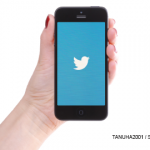
Image Credit: YS PRYKHODOV/SHUTTERSTOCK.COM
Jonathan Hausmann, MD, a pediatric and adult rheumatology fellow at Beth Israel Deaconess Medical Center and Boston Children’s Hospital, remembers seeing a patient with a red, swollen and tender big toe early in his fellowship and diagnosing his patient with gout.
He was happy to be able to help the patient, and he called in a prescription for colchicine, a standard gout treatment.
In the morning, he got a call from the pharmacy: They didn’t fill the patient’s prescription because it adversely interacts with another of the man’s medications, atorvastatin.
Dr. Hausmann was unaware of this interaction, but several sources reported that the medications had the potential for adverse reactions and should be avoided. He paged his attending physician, but it took a while to hear back.
In the meantime, he turned to Twitter for help, receiving tips from practicing rheumatologists that directly affected his clinical care.
Social Media & Medicine
More and more doctors are finding Twitter to be a fertile ground for learning, for keeping in touch with colleagues, and staying tuned in to patient attitudes and concerns. And it occasionally has a clear effect on how they treat patients.
Social media isn’t new, of course, but while Twitter for some doctors is a daily routine, as standard as seeing patients in clinic, the uptake has been very slow among scores of other doctors who question the value of Twitter or distrust it. So even as physician Twitter users trade thoughts about protocols with one another and broaden their insights into their profession far away from big conferences, strengthening bonds with each other in the process, many others are completely uninvolved.
Dr. Hausmann says he began using Twitter a year ago, figuring he’d likely reap some benefit.
“If you follow a rheumatology doctor that you know and trust … it’s just like calling a friend and asking for advice,” he says. Except with Twitter, it’s more efficient.
Back to the Case
In the case of the patient with gout, he quickly received responses. After receiving the fifth tweeted response saying that experience had shown that patients could in fact take colchicine and atorvastatin together, Dr. Hausmann was swayed.
“I was convinced that it was probably OK for my patient to take this medicine,” Dr. Hausmann says. “I called CVS, and I said, ‘You know what? I want you to give him this medicine anyway because the benefits greatly outweigh the risks.’”
‘You can get into trouble driving a car. That doesn’t mean you shouldn’t be driving a car. … You just have to be smart about what you do.’
The Benefits
Dr. Hausmann conducted a small survey of 37 doctors who are active on Twitter, asking about the benefits they get from the app. Physicians reported five main benefits. They say Twitter helps them:
- Stay up to date with the medical literature;
- Teach (e.g., by sending links to patients and students) and learn;
- Better understand patients;
- Stay connected with other physicians; and
- Be better physicians overall.
Rheumatology Journal Club
In late January, rheumatologists from around the world participated in the first-ever Twitter-based Rheumatology Journal Club. The chosen article was a study about lupus nephritis treatment. To follow the conversation, participants use the hashtag “#rheumjc” at the end of all their tweets. The “sessions” were held at two different times to take into account time differences and allow for broader global input. About 50 participants from 14 countries—even some nephrologists—gave their take on the findings and how it would or wouldn’t impact their care. More than 500 comments were made during the two hour-long sessions.
One of the club’s key organizers, Chris Collins, MD, associate professor of medicine at Georgetown University Medical School, says Twitter is particularly fit for physicians because of its increasing acceptance as a tool in medical education and ease of use.
“It’s open access, and it’s easy to make new connections,” he says. “It’s great; it’s all about optimizing interactions without barriers to geography or anything else.”
Get Engaged
He has also participated in several other healthcare-related live tweet chats, answering general questions about patient care—but without trying to give individualized medical advice.
“Any time you get patients engaged in a conversation about their disease, you help develop a more well-informed patient,” he says. “I see Twitter as one potential way of getting patients to take a greater role in their own healthcare.”
Ronan Kavanagh, a highly regarded rheumatologist in Ireland and a known Twitter enthusiast, says he is on Twitter about eight to 10 times a day. He says it exposes him to networks of people essential to modern medical care—such as medical humanities and medical technology—that he couldn’t get from traditional sources.
“It also allows me to learn every day—rather than saving up my learning for big meetings,” he says.
Just recently, he says, he saw a paper posted on Twitter about the use of high-dose fish oils as an add-on to triple therapy in early RA—and he’ll be trying out that approach.
At Beth Israel, Dr. Hausmann gave Rheumatology Grand Rounds about using social media to make you a better rheumatologist. He has given the talk elsewhere as well, and he says, “I don’t think I was able to convince anybody about the usefulness of Twitter, which is kind of sad.”
Cautions
There are certainly reasons to be cautious when using Twitter, users agree. Many physician Twitter users have a special account devoted only to professional use and only post material they would be comfortable having patients and colleagues see. They don’t post personal information under those usernames.
The American Medical Association has published guidelines on professionalism in social media. Suggestions include:
- Respect patient privacy;
- Maintain appropriate boundaries when interacting with patients on social media;
- Report unprofessional content that’s been posted; and
- Recognize that online actions can negatively affect reputations.
Those who use Twitter say those rules are appropriate, but say doctors shouldn’t overreact and be blind to the benefits. He says his hospital gave a talk about social media when he first started working there, and it was all about how to avoid getting into trouble.
“That’s a huge concern by many physicians,” he says. “Sure, but you can get into trouble driving a car. That doesn’t mean you shouldn’t be driving a car. … You just have to be smart about what you do. And the main thing is, just don’t use it as a place to take out your aggression about other doctors or patients. … I think we have to change the discussion. Instead of, ‘Here are all the problems with social media,’ I think we have to change that to say, ‘These are all the great things about social media.’”
Thomas R. Collins is a freelance medical writer based in Florida.



